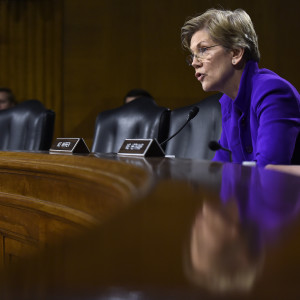Divorces get ugly — and costly — when lawyers get involved. Often, the lawyers end up with more money than the estranged couple. Which is why many couples elect to use an arbitrator to arrive at a settlement that’s fair to both, agreeable to both — and which doesn’t bleed either of them white, leaving lawyers with the lion’s share of the couple’s assets.
A similar process has been available to financial services customers — credit card holders and those doing business with a lender such as a bank. Arbitration clauses are often built into the terms of service; the idea being to provide a way to settle disputes without having to resort to lawyers — and litigation.
Seems reasonable.
And yet a federal regulatory body — the Consumer Financial Protection Bureau — recently (and unilaterally) issued a ban on arbitration clauses, ostensibly to help consumers by making it easier for them to litigate.
But by pushing arbitration to the back burner — or even off the table — the CFPB is effectively encouraging litigation as the first resort rather than the last resort. And that almost inevitably means the dispute gets very expensive before anything gets resolved. And when it finally does get resolved, the main beneficiaries are — you guessed it — the lawyers.
Interestingly, the CFPB is the creature of Democrat senator and leftie lawyer Elizabeth Warren, an instinctive foe of solutions arrived at freely between individuals, without the “help” of government.
Warren says the CFPB’s rule is necessary in order to “allow working families to hold big banks accountable when they’re cheated and help discourage the kinds of surprise fees that consumers hate.”
This sounds OK. Like the health care “reform” talk prior to the imposition of the not-so-Affordable Care Act, also known as Obamacare. If you like your doctor, you can keep your doctor.
Maybe you recall.
People were promised lower premiums, more choice. They ended up with higher premiums and less choice. Then-Speaker Nancy Pelosi (a supporter of the CFPB’s arbitration ban) along with Democratic Rep. Maxine Waters assured an uneasy public not to worry; that “you have to pass it to find out what’s in it.”
This time, though, it might be better to read the thing and know what’s actually in the thing before it is imposed on the public.
Diving into the details, we find that the CFPB’s decree is a power bonanza for the federal regulatory apparatus as well as a meal ticket for trial lawyers. The CFPB empowers itself to have an “ongoing role” in dispute management, setting itself up as the arbitrator — whether the consumer wants that or not.
The paternalism of this is particularly striking. Warren, like many on the left, seems to think that people who aren’t Harvard Law professors are too feeble minded to read contracts or act in their own best interests. They need guidance from wiser heads — like Warren — and whether they asked for it or not.
The CFPB would also require businesses to submit to CFPB bureaucrats all details regarding successful arbitration, including the amount of any settlements agreed to by the parties. In other words, even if the claim never goes before a court and everything is settled amicably, the CFPB still insists on butting in.
In other words, even when there is no problem, it must be treated as if there were a problem.
It also means yet another cost of doing business that, necessarily, will be passed on to consumers — who always foot the bill for government “services,” including those they never asked for.
Most outrageous, though, is the CFPB’s insistence on banning arbitration outright. This would apply to numerous forms of lending and credit card contracts, leaving both consumers and businesses no choice but to settle any dispute through the courts, a burdensome and expensive process for both parties.
Resorting to lawyers and the courts may, indeed, prove necessary in some instances and there is nothing wrong with pursuing that option when there is no other option. But removing the option to try arbitration first, as Warren, Pelosi and Waters are demanding, amounts to a power grab as well as a money grab. Neither is in the interests of the public.
So far, Congress agrees.
The House — deploying the Congressional Review Act, which gives power to Congress to countermand regulatory fatwas within 60 days of their issuance and bars federal regulatory bodies from issuing similar rules in the future — has already voted to quash the CFPB’s rule.
The Republican-controlled Senate is poised to do the same and President Trump has indicated he will sign repeal legislation when it reaches his desk.
As they ought to.
As he promised to.
The voters didn’t elect Elizabeth Warren, Nancy Pelosi and Maxine Waters to increase federal regulatory micromanagement of the country. They elected a Republican House, Senate and president to reign in an out-of-control regulatory apparat.
They now have a golden opportunity to do exactly that.

